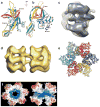Cell cycle regulation of DNA replication
- PMID: 17630848
- PMCID: PMC2292467
- DOI: 10.1146/annurev.genet.41.110306.130308
Cell cycle regulation of DNA replication
Abstract
Eukaryotic DNA replication is regulated to ensure all chromosomes replicate once and only once per cell cycle. Replication begins at many origins scattered along each chromosome. Except for budding yeast, origins are not defined DNA sequences and probably are inherited by epigenetic mechanisms. Initiation at origins occurs throughout the S phase according to a temporal program that is important in regulating gene expression during development. Most replication proteins are conserved in evolution in eukaryotes and archaea, but not in bacteria. However, the mechanism of initiation is conserved and consists of origin recognition, assembly of prereplication (pre-RC) initiative complexes, helicase activation, and replisome loading. Cell cycle regulation by protein phosphorylation ensures that pre-RC assembly can only occur in G1 phase, whereas helicase activation and loading can only occur in S phase. Checkpoint regulation maintains high fidelity by stabilizing replication forks and preventing cell cycle progression during replication stress or damage.
Figures






Similar articles
-
Mechanism of chromosomal DNA replication initiation and replication fork stabilization in eukaryotes.Sci China Life Sci. 2014 May;57(5):482-7. doi: 10.1007/s11427-014-4631-4. Epub 2014 Apr 4. Sci China Life Sci. 2014. PMID: 24699916 Review.
-
Factors affecting the diversity of DNA replication licensing control in eukaryotes.Curr Biol. 2009 Mar 24;19(6):530-5. doi: 10.1016/j.cub.2009.02.034. Epub 2009 Mar 12. Curr Biol. 2009. PMID: 19285403
-
Distinct roles for Sld3 and GINS during establishment and progression of eukaryotic DNA replication forks.EMBO J. 2006 Apr 19;25(8):1753-63. doi: 10.1038/sj.emboj.7601063. Epub 2006 Apr 6. EMBO J. 2006. PMID: 16601689 Free PMC article.
-
The interaction networks of the budding yeast and human DNA replication-initiation proteins.Cell Cycle. 2019 Mar-Apr;18(6-7):723-741. doi: 10.1080/15384101.2019.1586509. Epub 2019 Mar 19. Cell Cycle. 2019. PMID: 30890025 Free PMC article.
-
DNA replication origins, ORC/DNA interaction, and assembly of pre-replication complex in eukaryotes.Acta Biochim Biophys Sin (Shanghai). 2010 Jul;42(7):433-9. doi: 10.1093/abbs/gmq048. Epub 2010 Jun 9. Acta Biochim Biophys Sin (Shanghai). 2010. PMID: 20705581 Review.
Cited by
-
Properties of the human Cdc45/Mcm2-7/GINS helicase complex and its action with DNA polymerase epsilon in rolling circle DNA synthesis.Proc Natl Acad Sci U S A. 2012 Apr 17;109(16):6042-7. doi: 10.1073/pnas.1203734109. Epub 2012 Apr 2. Proc Natl Acad Sci U S A. 2012. PMID: 22474384 Free PMC article.
-
Phosphorylation of CMG helicase and Tof1 is required for programmed fork arrest.Proc Natl Acad Sci U S A. 2016 Jun 28;113(26):E3639-48. doi: 10.1073/pnas.1607552113. Epub 2016 Jun 13. Proc Natl Acad Sci U S A. 2016. PMID: 27298353 Free PMC article.
-
Novel features of ARS selection in budding yeast Lachancea kluyveri.BMC Genomics. 2011 Dec 28;12:633. doi: 10.1186/1471-2164-12-633. BMC Genomics. 2011. PMID: 22204614 Free PMC article.
-
LCAT1 is an oncogenic LncRNA by stabilizing the IGF2BP2-CDC6 axis.Cell Death Dis. 2022 Oct 18;13(10):877. doi: 10.1038/s41419-022-05316-4. Cell Death Dis. 2022. PMID: 36257938 Free PMC article.
-
Nucleotide supply, not local histone acetylation, sets replication origin usage in transcribed regions.EMBO Rep. 2010 Sep;11(9):698-704. doi: 10.1038/embor.2010.112. Epub 2010 Jul 30. EMBO Rep. 2010. PMID: 20671737 Free PMC article.
References
-
- Adachi Y, Usukura J, Yanagida M. A globular complex formation by Nda1 and the other five members of the MCM protein family in fission yeast. Genes Cells. 1997;2:467–79. - PubMed
-
- Aggarwal BD, Calvi BR. Chromatin regulates origin activity in Drosophila follicle cells. Nature. 2004;430:372–76. - PubMed
-
- Alcasabas AA, Osborn AJ, Bachant J, Hu F, Werler PJ, et al. Mrc1 transduces signals of DNA replication stress to activate Rad53. Nat Cell Biol. 2001;3:958–3. - PubMed
-
- Aleem E, Kiyokawa H, Kaldis P. Cdc2-cyclin E complexes regulate the G1/S phase transition. Nat Cell Biol. 2005;7:831–7. - PubMed
-
- Alexandrov AI, Botchan MR, Cozzarelli NR. Characterization of simian virus 40 T-antigen double hexamers bound to a replication fork. The active form of the helicase. J Biol Chem. 2002;277:44886–277. - PubMed
Publication types
MeSH terms
Grants and funding
LinkOut - more resources
Full Text Sources
Other Literature Sources
Molecular Biology Databases

